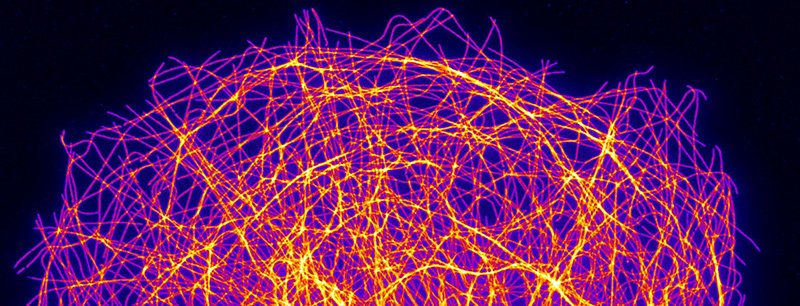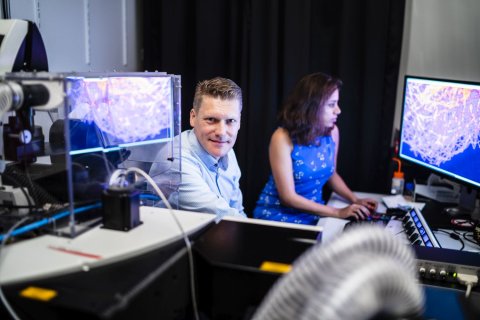Lukas Kapitein appointed Professor of Molecular and Cellular Biophysics
The Executive Board has appointed Lukas Kapitein to the position of Professor of Molecular and Cellular Biophysics at the Faculty of Science’s Department of Biology. Kapitein studies the architecture and dynamics of cells, with a particular focus on neurons: how do they obtain and maintain their complicated form? By using concepts and techniques from the field of physics, his group aims to unravel basic principles of cellular biology.
What is Kapitein, originally a physicist, doing at the Department of Biology? “In biology, we use physics in two different ways”, he explains. “On the one hand, many important techniques are based on the principles of physics. For example, my group is specialised in advanced light microscopy, which we use to create high-resolution videos of what specific proteins do in living cells. But you can also use physics to understand complex biological processes based on the underlying fundamental principles, which you can then express in mathematical models. The advantage to these models is that you can often derive precise predictions from them, which you can then use to test the model.”
Transport in neurons
Instead of focusing on simple cells in his work, Kapitein studies the most complex cells possible: neurons. These cells have sophisticated forms, and are so large that they need special transport systems in order to bring all of the components to the right place in the cell. This is facilitated by the cytoskeleton, a mechanical network of protein filaments that give the cells their shape and rigidity, and along which special motor molecules can move.
Kapitein’s group is specialised in visualizing the cytoskeleton and in manipulating the motor molecules in a controlled manner in order to understand how they work in the cell. “That gives us more and more insight into the cell’s road map and traffic rules. Eventually, I want to understand how the combined activity of vast numbers of different tiny molecules can lead to a durable, orderly system that is thousands of times larger than the individual building blocks”, says Kapitein.

Research ecosystem
A better understanding of how neurons work also helps us understand what can go wrong inside them. “For example, what goes wrong in different cases of nerve damage? And is it possible to repair a damaged axon, for example?” Kapitein does not work with patients himself, but his research does provide a foundation for neuroscientists and medical researchers.
“I think that you shouldn’t pit applied and fundamental research against one another. Together they form the ecosystem of science. Nobody can do everything themselves, so cooperation and making connections is vital. That’s why it’s so attractive to work in Utrecht: the full spectrum of research is represented here, from fundamental physics to medical brain research. I really enjoy having connections to so many of these research groups.”
Education
Interdisciplinary education is an important part of the chair position. Since the start of the year, Kapitein has served as the programme leader for the Master’s programme Molecular and Cellular Life Sciences. He also organises several courses on microscopy. “I enjoy teaching biology students the principles of physics. But I also want to get physics students interested in the life sciences.” He applies his own enthusiasm for biophysics to build a bridge between the disciplines. “I always get excited when my PhD candidates show me new data. I see a video of proteins moving inside a cell, and every time I think it’s amazing that it all just works.”
Lukas Kapitein

Lukas Kapitein (1978) has worked as Assistant Professor and research group leader at the Division of Cell Biology within the Department of Biology since 2011. He was promoted to Associate Professor in 2016. Kapitein earned his Master’s degree in Physics at the VU Amsterdam in 2002, and he earned his PhD cum laude as a biophysicist at the same university in 2007. From 2007 to 2011, he worked as a postdoc at the Erasmus MC’s Department of Neurosciences, where he started his research on the transport processes in neurons with support from a Veni grant and an Erasmus MC fellowship. In 2013, he received an ERC Starting Grant from the European Research Council, and a Vidi grant from NWO.
Read more
- Selective transport in neurons understood (Neuron, 2017)
- Quantum dots clarify transport within the cell (Nature Communications, 2017)
- Innovative collaboration between biologists and physicists for brain research (FOM grant, 2016)
- ‘Road network’ in nerve cell endings visualised in superresolution (Nature Communications, 2015)
- Researchers control transport in neurons using light (Nature, 2015)

